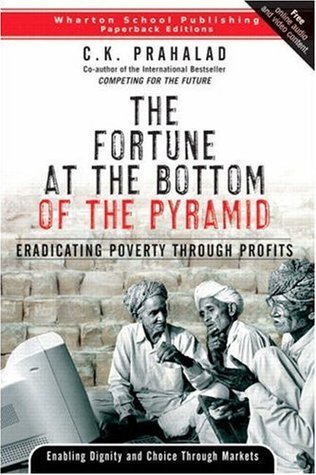What do you think?
Rate this book


430 pages, Kindle Edition
First published July 26, 2004
What is needed is a better approach to help the poor, an approach that involves partnering with them to innovate and achieve sustainable win-win scenarios where the poor are actively engaged and, at the same time, the companies providing products and services to them are profitable.
The poor cannot participate in the benefits of globalization without an active engagement and without access to products and services that represent global quality standards.Is it true that preservative-filled wheat starch, corn syrup based foods that meet “global quality standards” are better than the food the poor were able to grow and cook themselves before they were pushed off their land by agribusiness and had their local variety constricted by corporate domination of the local markets? Have the poor always stuffed their cows with antibiotics, their crops with pesticides, their soap with Triclosan? Are the cheap plastic goods of globalization better than the things they made themselves?
The poor present a ‘latent market’ for goods and services."Latent market" means there are needs which the poor currently meet via their own resources, but with the right marketing, corporations can convince them to rely on corporate products instead.
private-sector competition for this market will foster attention to the poor as consumers. It will create choices for them. They do not have to depend only on what is available in their villages.The poor are to be seen as “consumers”, not people, and attention focused on how to manipulate them into consuming corporate products. Over time, they will be transitioned into consumers, rather than the producers they once were, and since corporations have advantages of marketing, scale, and political power, village-sourced products that compete with those of the MNC will soon no longer be made.
Free and transparent private-sector competition, unlike local village and shanty-town monopolies controlled by local slum lords, can transform the “poor” into consumers.Assumes that poor people are helpless weaklings controlled by slum lords until the corporations come with their gifts of “free and transparent private-sector competition” to save them by transforming them into corporate consumers.